Mar 2006
Mar 2006 sadminAdvise: Focus on reproductive health
Advise: Focus on reproductive health sadminFebruary was Reproductive Health Month on the Department of Health’s Health Awareness Calendar. During this period, people were made aware of health issues such as pregnancy, contraceptives, sterilisation, abortion, sexually transmitted diseases, infertility and menopause.
What is contraception?
It is the prevention of pregnancy through temporary or permanent methods. There are different types of contraception including pills and injections, devices known as loops that are inserted into the uterus, condoms for both men and women, sterilisation through a small operation for both men and women, and natural contraception.
What can I do if I’m pregnant and HIV positive?
Go to a clinic where voluntary counseling and testing is provided. Your CD4 count will be taken to determine the extend of the disease. The chances of babies born HIV positive is much lower if steps are taken to prevent mother to child transmission.
What is infertility and what causes it?
It is when a woman cannot get pregnant. There are different causes of infertility. Some can be treated, but sometimes the causes are unknown. A low sperm count in men, as well as sexually transmitted diseases that have been left untreated or have been treated poorly, are among the causes of infertility.
How can infertility be prevented?
Because sexually transmitted diseases are one of the main causes of infertility, such diseases should be prevented by having protected sex at all times, especially when not planning to have a baby. Sexually transmitted diseases should be treated immediately at a hospital or clinic.
Is abortion a safe way to end pregnancy?
There are always risks involved. People are encouraged to use contraception to avoid unplanned pregnancy. Abortion should only be considered when everything else like contraception and emergency contraception has failed, preferably within the first 12 weeks of pregnancy.
WHAT ARE THE RISKS OF ABORTION?
If done under unsafe conditions, it may cause severe bleeding or infection. This may cause damage to the uterus or even death.
For more information on reproductive health call the Khomanani toll free number 0800 012 322. Write to Vuk’uzenzele Health Advice, GCIS, Private Bag X745, Pretoria, 0001, and the Department of Health will advise you. Email us: vukuzenzele@gcis.gov.za
Anniversaries
Anniversaries sadminWomen’s March, 9 August 1956
On 9 August each year, South Africa celebrates National Women’s Day. On this day in 1956, some 20 000 women from all over the country marched to the Union Buildings in Pretoria. They protested against the unjust pass laws of the apartheid government.
Today, 50 years later, South Africa is a democracy with a non-sexist and non-racist society. To mark the 50th anniversary of the women’s march, the Office of the Status of Women in the Presidency is organising special celebrations.
Adoption of the Constitution, 8 May 1996
The Constitution of the Republic of South Africa was adopted on May 8, 1996. On December 10, 1996, it was signed into law. Before it was fully approved to become law, the words were revised and changed to be in line with the Constitutional guidelines negotiated at Codesa (Convention for a Democratic South Africa) in 1991. Many people were involved in the process of writing the Constitution. It was the largest public participation programme ever carried out in South Africa. After nearly two years of consulting with various groups, the final text was written. It includes the ideas of ordinary citizens, as well as organisations and political parties, thus representing the combined wisdom of the country’s people. The Constitution calls on all South Africans to embrace a non-racist, non-sexist, open and democratic society based on human dignity, equality and freedom.
100th anniversary of Bambata Rebellion, 4 April 1906
This year marks the 100th anniversary of the Bambata Rebellion. In 1906 Chief Bambata led his people in protest against poll tax. The tax was introduced by the colonial government of the province that was then called Natal. Chief Bambata believed that the £1 (one pound) tax was unfair because his people could not afford to pay it. The tax was introduced to force people into working for wages to get cash to pay the tax rather than living off the land. The colonial government reacted against the protest with force and Chief Bambata was killed.
Soweto Uprising, 16 June 1976
On June 16, 1976, schoolchildren in Soweto protested against the apartheid government’s unjust education laws. Their main problem was that it was compulsory for black learners to be taught in Afrikaans, but there were also other racial problems and frustrations with Bantu Education. The uprising started peacefully, but became violent when the police fired shots at the young protestors. Some 575 people died and over 3 000 were injured. Through this uprising, resistance spread to more communities.
50th anniversary of the Treason Trial, 3 August 1956
The Freedom Charter was adopted in 1955. The apartheid government arrested 156 people and charged them with treason. Most of them were leaders of the African National Congress (ANC), the Congress of Democrats, the South African Indian Congress, the Coloured People’s Congress, and the South African Congress of Trade Unions. As a group they were known as the Congress Alliance. Four years later they were all acquitted.
19 October 1986, 20th Anniversary of the death of Samora Machel
In 1986, the former President of Mozambique, Samora Machel, died in a plane crash in Mbuzini, Mpumalanga. Twenty four passengers died with him. Because the real cause of the crash is still not known or whether it was really an accident, President Thabo Mbeki asked that it should be looked into again. The Minister of Safety and Security said that the investigation into what happened 20 years ago on that day will be re-opened in co-operation with Mozambique.
Miner’s Strike, 12 August 1946
Thirty years ago, on 12 August 1946, some 60 000 black mine workers in Johannesburg started a strike for higher wages. The strike was led by the African Mine Workers Union, whose president, JB Marks, was also a leader in the South African Communist Party. In the week that followed, the police and army used violence to crush the strike.
11 September 1906, Satyagraha centenary
This year marks the 100th anniversary of Mahatma Gandhi’s Satyagraha – passive resistance campaign. On 11 September 1906 Mahatma Gandhi started the movement known as Satyagraha in Johannesburg. It promoted non-violence as a way to protest against injustice. On this day, Indians in the then Transvaal province, started a programme of peaceful resistance against the unfair registration and pass laws of the apartheid government.
Anyone can start a small business
Anyone can start a small business sadminAre you sitting at home worrying because you don’t have a job? Why not use the opportunities created by government and improve your lives! Many people who were unemployed in the past are now able to put bread on the table thanks to funding for small businesses through government’s economic programmes.
Funding
It does not matter where a person lives in South Africa, he or she can start a small business such as dressmaking, hairdressing, photography or crafts by applying for funding from government. Take the example of the group of women from Kamden, in the North West Province.
Self-employed
Six years ago, they were unemployed and today, thanks to the Maekaelelo Sewing Project of the Department of Arts and Culture, they are self-employed. They used the money to start the Maekaelelo Sewing Project, which enables them to feed their families.
Determination
Maekaelelo, a Setswana word for “determination” was established in 2001. Government initially contributed R250 000 towards the project. Two years later they put in an additional R325 000. When the leader of Maekaelelo, Lydia Mangate, 47, talked to Vuk’uzenzele in February, she said, “This kind of help is really empowering women in the rural areas,” she said. Mangate said the support the project received showed that the slogan of Vuk’uzenzele (Let’s make it happen) could truly improve people’s lives.
Government training
The Rethabile Community Development Sewing Project was started by four unemployed women. They received R85 000 from the North West Department of Social Development to start their project. The money they received from government was used to buy five sewing machines and material. The department also helped to train members of the project in business management. Fikile Sefunda, 32, who just joined the project from Mpumalanga. She proudly displayed the school shirts she made. “We are making school uniforms for five schools in our area,” she said. “We don’t make a lot of money, but at least we are able to feed our families,” Sefunda said.
For more information on self-help programmes call 1020
Asgisa brings Benefits for all
Asgisa brings Benefits for all sadminFast track to realize dreams...
Fighting poverty, creating jobs, reducing unemployment and building a stronger economy. These are the aims behind Asgisa - the Accelerated and Shared Growth Initiative for South Africa, said President Thabo Mbeki when he addressed the nation at the opening of Parliament in February.
National effort
The message in his State of the Nation Address was simple – the people of South Africa believe that because of what they have achieved, the country can move even faster towards the realisation of its dreams. “Our people are firmly convinced that our country has entered its Age of Hope,” he said. South Africans overcame apartheid to win freedom and build democracy; they have been working together to fight poverty and grow the economy - what we need, he said, is to continue this national effort and speed up progress.
Growth
In his State of the Nation Address, the President explained that Asgisa is a key part of government’s programme. Deputy President Phumzile Mlambo-Ngcuka is leading Asgisa. It will open the way for faster implementation of the various programmes of government. Through Asgisa government is focusing on overcoming the things that have held the economy back from growing as fast as it could. It will tackle these things in a way that will help close the gap between the First and Second Economies (see box below) to make sure that poor people share in the country’s growing wealth. The aim is to speed up economic growth to at least 6% a year between 2010 and 2014. This will help halve unemployment and poverty by 2014
Infrastructure
R370 billion has been set aside for Asgisa infrastructure programmes. Some of these programmes will strengthen the economy by investing in the electricity, transport and telecommunications systems. To improve service delivery in underdeveloped urban and rural areas, Asgisa will work through the Municipal Infrastructure Grant, Expanded Public Works Programme (EPWP) and other infrastructure funds. These will improve service delivery such as roads and railways, water, electricity, housing, schools and clinics, business support centres, sports facilities and government service centres.
Opportunities
The EPWP also helps reduce poverty. It was launched in 20004. Since then, over 280 000 people, many of them women heading families, have been given temporary jobs. Through EPWP people work in road construction, water projects, community care and development projects, and environmental projects. They also get on-the-job training to learn skills that will help them find more permanent jobs. Asgisa will boost the development of small business. This will focus on black economic empowerment and the development of women and young people. Asgisa will also improve current business-support programmes like Mafisa (for agricultural development); SEDA (Small Enterprise Development Agency); Khula; Umsobomvu Youth Fund and the Small Business Initiative.
South Africa has been enjoying steady growth for more than ten years now. In the last two years growth has increased and is set to speed up further. This is one indication that the country has entered its “Age of Hope” for all.
First Economy - Advanced, increasingly competitive and impacting on people with the necessary skills.
Second Economy - Mostly poor, and lacking skills and access to information. People find it hard to make a proper living due to the legacy of apartheid.
Budget 2006
Budget 2006 sadmin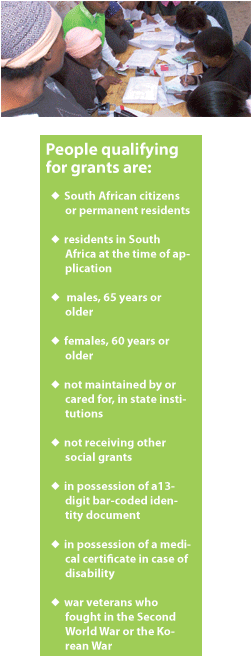 Tlala o kotsing. These Sesotho words loosely translate as “hunger you are in trouble”. They were repeatedly used by Finance Minister Trevor Manuel during his Budget Speech.
Tlala o kotsing. These Sesotho words loosely translate as “hunger you are in trouble”. They were repeatedly used by Finance Minister Trevor Manuel during his Budget Speech.
Social services
Manuel could not have chosen better words. His Budget was welcomed by almost all South Africans from different sectors of life. It is viewed as good news for the hungry and the poor. Education, social grants, small business, municipal service delivery, skills development and health are among the sectors that will get more money.
Small business
With the current budget, it is also a good time to start a small business, and maybe time to stop or cut down on drinking alcohol and smoking. Small businesses that make a profit of R40 000 a year and individuals earning the same amount of money a year, will no longer pay tax. Businesses making R300 000 a year will only pay 10 per cent tax. Last year it was R200 000.
Smokers pay more
Smokers will now have to pay 52 cents more on a packet of cigarettes, while drinkers will pay 5 cents more on a 340ml can of beer, 13 cents more on a 750ml bottle of wine and R1,54 cents more on a 750ml bottle of spirits. However, Manuel put more smiles on the faces of those receiving social grants. From April 1 this year, disability and care dependency grants will be increased by R40 to R820 a month. The foster care grant will increase by R30 to R590 and child support grant by R10 to R190 a month. Over the next three years, government will use R33 billion for 2010 World Cup infrastructure like stadiums, the Gautrain Rapid Rail Link and local and national roads.
Less tax
It is also now cheaper to buy a house. When buying a house costing under R500 000, there will be no transfer duty cost – that is the money you pay to register the house in your name. Generally, all South Africans will pay less tax. R13,5 billion has been set aside to cut individual income tax. The economy is currently growing at 5 per cent a year, contributing to job creation. Quoting from a letter he had received from a member of the public, Manuel read: “This is the year of plenty when all South Africans will reap the fruits of economic growth.”
Cabinet explains
Cabinet explains sadmin
Government departments work in five ‘clusters’ to address challenges like skills development, job creation, poverty and service delivery. At the beginning of each year, after the President’s State of the Nation Address, the Cabinet Ministers brief the media on how the clusters - and the skills development programme - will contribute to government’s Programme of Action for the Year. Here are just a few of the highlights from the media briefings.
Economic
This cluster’s work will be closely aligned to Asgisa. Some of its projects focus on the improvement of the public transport system, water supply and skills development. One project aims to lower the cost of information and communication technology - once in place, the costs of telecommunications like landline telephones will be reduced. Support for small business will be another focus.
Social
Improving social-grants delivery and reducing the risk of grants being misused is a priority. In land reform, there will be a review of the “willing seller, willing buyer” approach - this is where government identifies land owned by white farmers for redistribution and the farmers have the chance to put the land up for sale. Expansion of the Early Childhood Development Programme will contribute to growth of the Expanded Public Works Programme (EPWP). The cluster also focuses on access to basic water and sewerage facilities and to affordable medicines.
Skills development strategy
The major challenge is to improve the quality of education at all levels. Poor schools will get better resources, while no-fee schools are being introduced in the poorest areas. The implementation of an Employment Services System will mean work seekers can be linked up with information about vacancies and learning opportunities across the economy.
Justice, Crime Prevention and Safety
Better crime prevention and public safety, the strengthening of the criminal justice system and improvement of our national security continue to be the main focus of the cluster’s work. Efforts to end violence and abuse against women and children will be strengthened by the Criminal Law (Sexual Offences) Bill which Cabinet will submit to Parliament. It will give attention to strengthening capacity to do these things, including training more police and police reservists, and to reducing the number of illegal firearms in the country.
International Relations, Peace and Security
The focus here is on our country’s relations with the rest of the world, and especially within our continent. It includes working with the African Union and United Nations through peace missions in other African countries such as Côte d’Ivoire, Democratic Republic of Congo and Sudan. As part of preparations for the 2010 Soccer World Cup, the Department of Sports and Recreation has started a programme called Sports for Development and Peace, with the United Nations.
Economic
In working to strengthen the state’s ability to deliver service and to implement the programmes of government, the cluster attends to the situation in all three spheres, national, provincial and local. Project Consolidate will continue to target improved municipal service delivery, by assisting 136 municipalities experiencing difficulties. The training of public servants will be improved to focus on the skills need for effective and efficient service.
Comic strip - Budget
Comic strip - Budget sadmin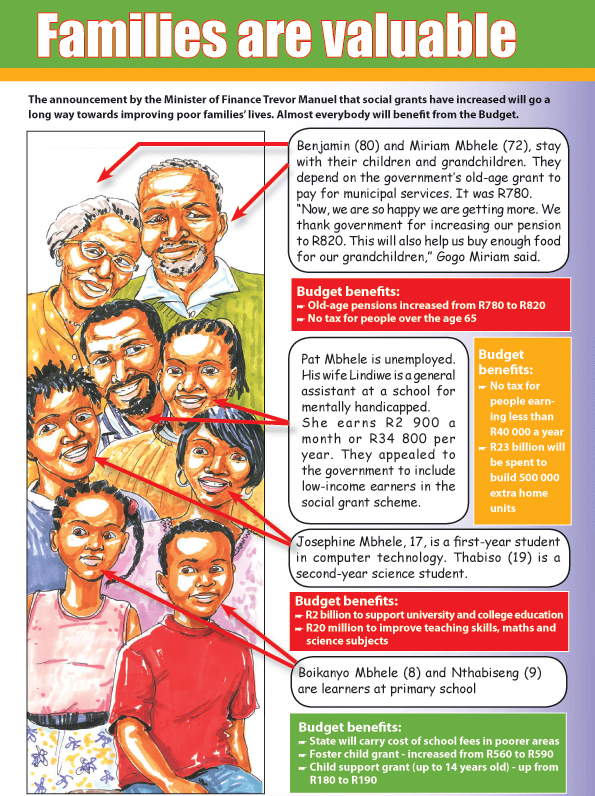
Comic strip - Credit
Comic strip - Credit sadmin
Credit can be your enemy
Credit can be your enemy sadmin“We all know that buying on credit can lead to huge financial problems but many still use credit facilities”
Buying on credit is something almost everybody has learned to live with.
Often when we need a new fridge, entertainment system or a car, the only way we can buy it is on credit. But what is credit, how does it work and who can get it? But what is credit, how does it work and who can get it?
Be careful with credit
Credit helps you buy goods and services without having to pay the full price up-front. With credit you are able to drive the car, wear your favourite clothing, and have the furniture of your choice and pay an agreed amount every month over a certain period. Buying on credit is not like lay-bye where you pay for something every month and then take it home after it is fully paid. You must be careful with credit, because it can become your enemy. If you lose your job, forget to pay in time or have extra expenses, it will be very difficult to pay your monthly installments.
Credit profile
The credit industry consists of three players – the consumer (the person who receives credit to buy a product), the credit grantors (companies that provide products and services to you such as banks, shops, and the credit bureau (the company where your credit profile is kept). Credit profiles are the history of a person’s or business’s repayment behaviour like whether you paid on time, stopped paying, fell behind with your payment, or have bad debts? “If someone wanted to borrow R1 000 from you, would you give it without knowing if the person can pay you back? Probably not,” argues Credit information Ombudsman Manie van Schalkwyk. If you could check that the person paid back money borrowed from someone else within the agreed time, you would feel more comfortable to lend them the money. This is where the credit bureau comes in, said Van Schalkwyk.
Information
Credit bureaus give information to banks, loan companies and big stores. They then use the information to decide whether to give you credit or not.
For more information on credit bureaus, contact the ombudsman on: 086 166 2837 or call 1020
Government’s plan of action for faster and shared growth.
Government’s plan of action for faster and shared growth. sadminKeeping it brief
Keeping it brief sadmin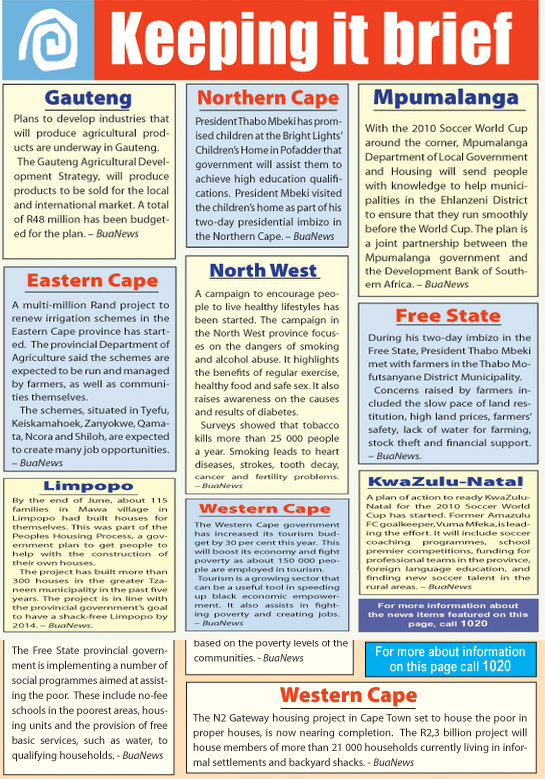
Letters
Letters sadmin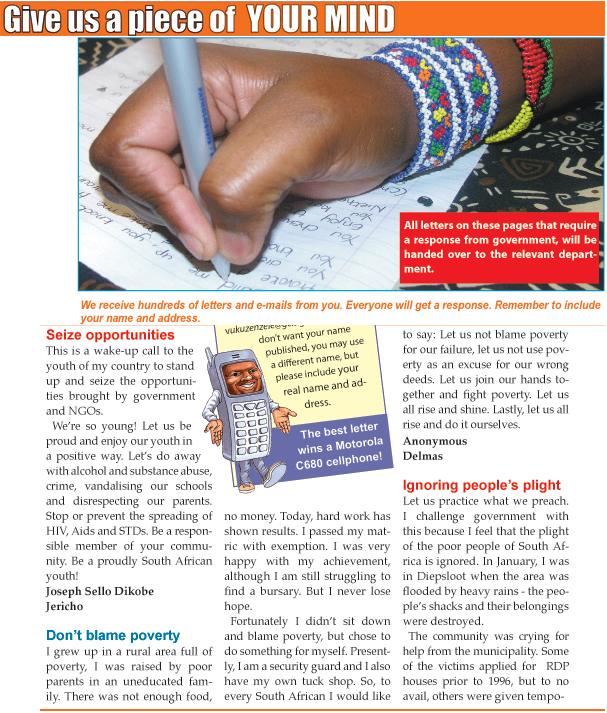
MORE HOUSES, more skills, more jobs
MORE HOUSES, more skills, more jobs sadmin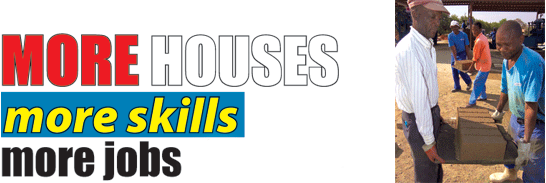
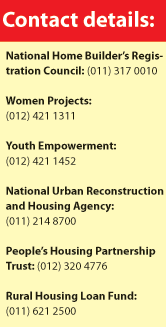
A total of 200 000 low-cost houses are provided by the Department of Housing each year. Through the provinces and municipalities, the Department of Housing is by far the largest constructor of houses in the country. According to the publication Housing and the Economy of South Africa, private companies constructed 40 000 houses in 2005, while the government built 200 000. These 200 000 houses are valued at an estimated R4,5 billion per year. In addition to providing low-cost housing, the construction has also created 15 000 direct jobs. A further 14 000 jobs have been created through the manufacturing of building materials.
Empowering women
To empower women, government has distributed 10% of all provincial housing budgets to projects led by women constructors. Since 2000, 290 out of 2 573 projects were allocated to women.
Training
To involve the youth in housing programmes, there is a youth internship programme targeting students heading for construction-related qualifications, offering bursaries to seven of them for 2006. In 2007, 20 students at universities of technology (formerly technikons) and universities will receive such bursaries. To make a stronger home-building industry, a skills-training programme for contractors has been introduced by the National Home Builder’s Registration Council. This is a body established to protect house-owners from unfair homebuilders. This programme includes a course by the Construction, Education and Training Authority (CETA) in financial, project and construction management. An amount of R10 million has been budgeted to train 2 700 emerging constructors in housing. To date, more than 250 housing constructors have been trained. The budget will be increased to R20 million in 2006 and training centres will be established countrywide.
Affordable finance
Other institutions, such as the National Housing Finance Corporation provide, among other things, affordable housing loans. The National Urban Reconstruction and Housing Agency provides finance to established and emerging contractors who build subsidised houses, credit-linked (bond) housing, rental housing and infrastructure and community facilities. During the 2004 financial year, the agency approved 47 loans to emerging contractors to the value of R63 million. It involves about 17 000 housing units. The agency paid out 15 loans to the value of R55 million to established contractors in the same year.
Encouraging support
The People’s Housing Partnership Trust supports the people’s housing process. The Trust encourages support for organisations that help people to develop building- and project-management skills for housing delivery. The Rural Housing Loan Fund was formed to assist poor families in the rural areas with funds to build their own houses and improve their living conditions. In 2005, more than 15 000 people received loans to the value of a total of more than R69 million.
Sharing costs of electricity
Sharing costs of electricity sadminA grandmother living in a four-roomed house in Khuma township, North West and another living in a similar house with the same standard of living in Soweto, Johannesburg, do not pay the same electricity rates.
The difference is due to municipalities charging different rates for electricity. Currently, people receive electricity in two ways – directly from Eskom or from their municipalities, who buy the electricity from Eskom and sell it to their communities. As a result, some people, especially the poor in the rural areas, are charged rates they cannot afford. In addition, some municipalities use the money they collect for electricity, to improve services other than electricity.
Living standards
To address the inequality in electricity tariffs, the Department of Minerals and Energy under Minister Lindiwe Hendricks, has set up the Electricity Distribution Industry (EDI). This is a body that is responsible for the restructuring of the industry to ensure affordable electricity supplies for all. Through the EDI, people in poor areas, like the grandmothers in Khuma and Soweto, will be charged according to the same scale. People in better-off suburbs like Sandton in Johannesburg or Westville in Durban, will be charged according to another scale. The process of changing the electricity distribution, is set to start soon.
Regional distributors
The changes will see the establishment of six municipal Regional Electricity Distributors countrywide. The first Regional Distributor was launched in Cape Town on July 1, 2005. The other five distributors are expected to start in the second half of this year. Spokesperson for the EDI Mbulelo Musi, said the Regional Distributors will ensure that closer co-operation between Eskom and municipalities results in more affordable rates.
Power failures
“The current system of electricity supply is old and causes power failures at homes and in public institutions such as hospitals,” he said. “Electricity infrastructure is also old and according to reports from the National Electricity Regulator, cities like Johannesburg still use facilities dating from 1938. “It is estimated that the country loses up to R8 billion per year due to electric failures,” Musi said.
New facilities
“The continued poor billing system and inefficiencies regarding other services like water provision, makes the situation even worse. These are the challenges the EDI aims to resolve.” The EDI caters for over seven million people who are mostly in the poorest section of the population. As part of the transformation, the EDI will change the old electricity facilities and replace them with new ones. Cabinet has assigned Hendricks, Provincial and Local Government Minister Sydney Mufamadi, Public Enterprise Minister Alec Erwin, and Finance Minister Trevor Manuel to oversee the process of establishing the remaining Regional Distributors.
For more information on Electricity Distributors, call (012) 316-7700 or 1020
Zero tolerance for social grant fraud
Zero tolerance for social grant fraud sadmin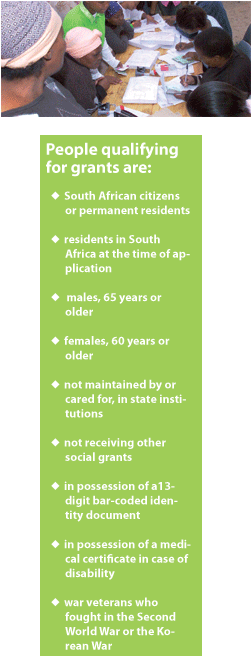 Government workers who receive social grants illegally should come clean. This is a message from the Department of Social Development to 43 000 government workers. The department’s external director of communications Kgati Sathekge said the government was losing R7, 3 million a month because of corrupt officials. “We have now adopted zero tolerance against anyone misusing public funds. We are prepared to root out corrupt practices,” he said.
Government workers who receive social grants illegally should come clean. This is a message from the Department of Social Development to 43 000 government workers. The department’s external director of communications Kgati Sathekge said the government was losing R7, 3 million a month because of corrupt officials. “We have now adopted zero tolerance against anyone misusing public funds. We are prepared to root out corrupt practices,” he said.
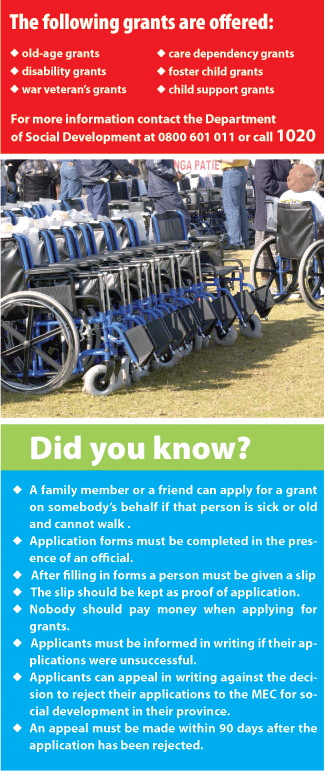 Regional distributors
Regional distributors
In 2005, the Department of Social Development established the Special Investigating Unit to investigate public servants who illegally received social grants. Sathekge said public servants who were illegally benefiting from the department’s social grants scheme prevented the government from helping those people who really needed it. “Social grants are meant to improve the lives of poor people. We cannot sit back and fold our arms while the money that is supposed to feed poor families does not reach them,” he said. “The department will open criminal cases against public servants who illegally receive social grants.”
Come clean
Sathekge said people who were involved in corruption would appear in court. “The court will give those who want to plead guilty an opportunity to do so. They can also make arrangements to pay back the money.” He said the department had established an internal committee that would decide what action should be taken against those who were found guilty. The department would also like to give those who wanted to “come clean” an opportunity to do so, said Sathekge.
Regional distributors
Corruption would not discourage the department to continue registering children under the age of 14 for the child support programme, he said. In 2005, the department registered the 6th million child for this programme. The department also gave people who were illegally receiving social grants a chance to come clean. As a result, 86 000 people came forward, he said. About 10 million South Africans are registered for social grants.